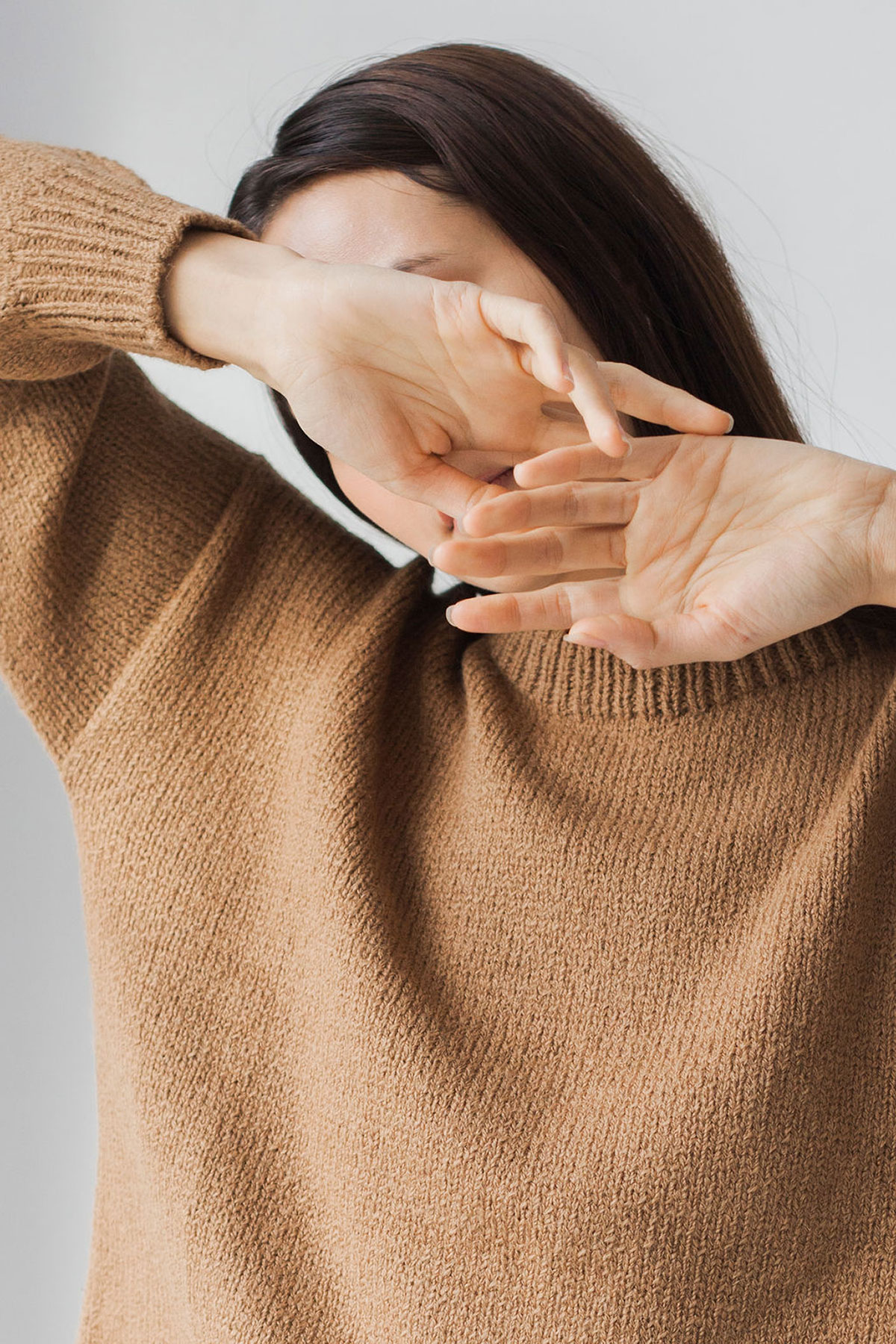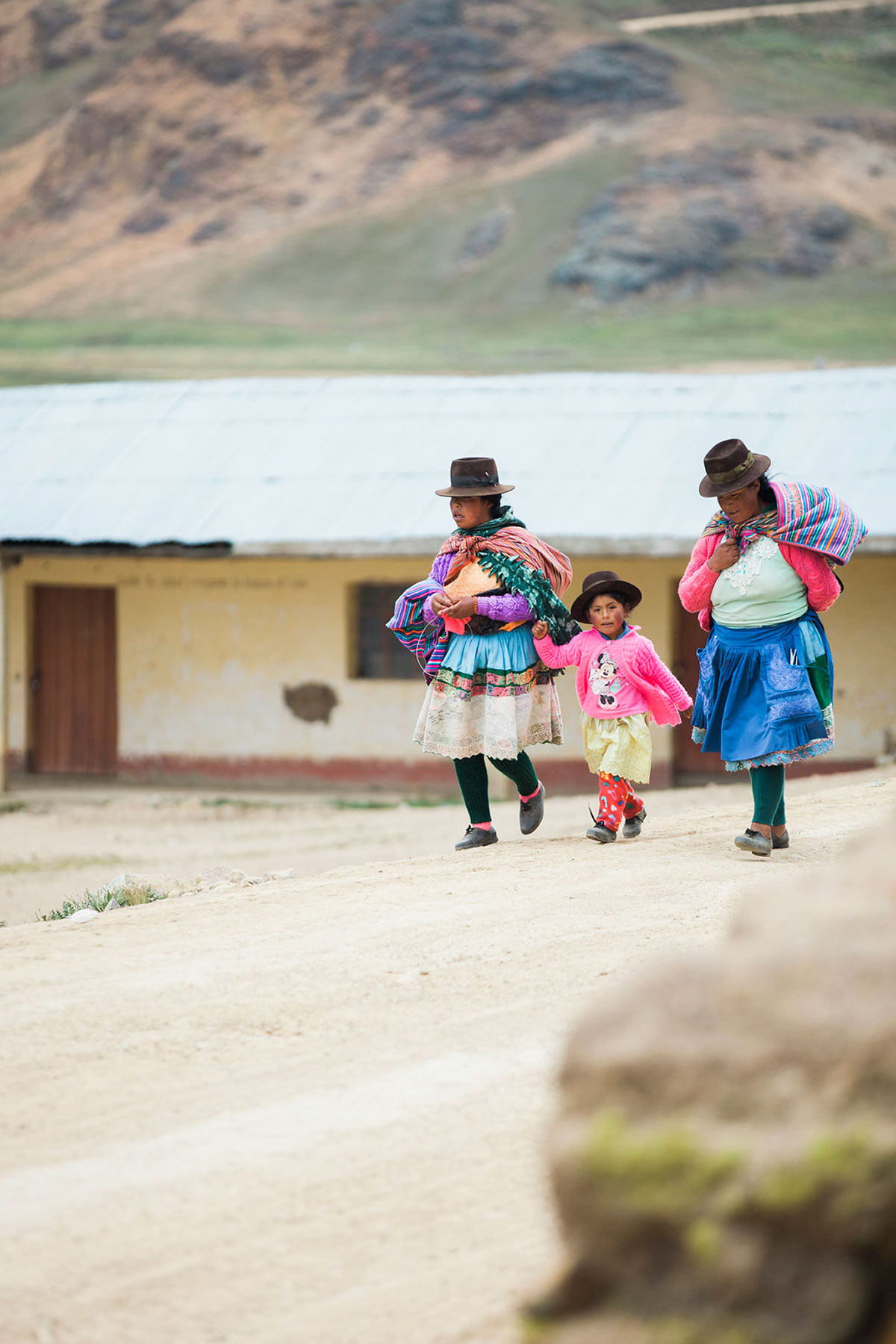From Peru to You: How Knitwear is Changing Artisan Lives
August 15, 2019 • 7 min read

All photos by @rebeccabenoit_
A workshop nestled in the Andes Mountains meets an atelier in the foothills of the Rockies. Two vastly differing landscapes and cultures come together with a common purpose – conscious design and the empowerment of women. And the incredible woman behind this union of natural fibre and modern design is Kelsey of Bare Knitwear.
I was only too excited to stumble upon Bare Knitwear on Instagram a few months ago, where I instantly fell in love. The quality of the sweaters and wraps displayed is evident even through a screen, and the story behind the brand’s products was inspiring to say the least. With a less is more philosophy, Bare Knitwear conveys simplicity, timelessness and impeccable quality.
I had a phone chat with Kelsey and hearing a brand owner’s own account of their process and their “why” is the reason supporting small and sustainable fashion goes far beyond just the physical item. By redefining “essentials” (read: actual essentials and not a closet stuffed full of this trendy term), Bare Knitwear dips into a time when a piece of clothing was treasured, worn for decades, and passed down. With a desire to provide the modern woman with pieces that make her feel good, that will be constant companions, and that are designed in order to celebrate her body rather than criticize it, this brand’s knitwear communicates the care and detail that every artisan pours into the pieces.
Kelsey herself has visited Peru countless times and works very closely with the skilled artisans that make her products. The direct connection to the things we wear is becoming less and less apparent (with more awareness, hopes are that we return to the way we used to do things, but for now, the trend is mass production and small margins). Knowing who made your clothes, that they were made with love, and by someone who has generations of craftsmanship in their blood puts actual feeling and emotion into a garment, versus the disconnect we seem to have with our fast fashion purchases.
_____

The Process
Bare Knitwear wholly believes in slow fashion. Doing away with the methodology behind fast fashion’s trends and season-specific releases, this brand produces one edited collection a year, reducing the amount of waste created and eliminating excess inventory. With a strong value of timeless design paired with the understanding of wardrobe staples, Bare Knitwear develops classic pieces that are versatile and meant to last.
Choosing to support and uplift the local textile industry in Peru, Bare Knitwear works with fibres that are native to the region, including baby alpaca blends and pima cotton. Selecting fibres based on their environmental properties, luxurious hand and durability is the core of the brand’s sourcing. Bare Knitwear sources raw materials from suppliers in Peru who are committed to supporting local farmers, communities and families in developing regions of the country.
Each piece of Bare Knitwear clothing is carefully crafted and celebrates the unique skill of the artisan who made it. By employing local weavers, the brand is able to contribute to the employment of 150-300 female artisans in Peru every year, helping to support livelihoods in an ethical way, as well as preserve Andean tradition.
_____

The Artisans
Kelsey was particularly drawn to the textile industry in Peru because of how rich and prevailing it is. Many young women living in Peru learn the basics of knitting from a young age, however due to the limited access to resources, revenue is hard to generate from their craft. With Peru being the knitwear hub of the world, production has moved to the larger cities of the country, where it can be conducted more efficiently and economically.
This is why Kelsey began sourcing her knitwear from the Huamanga region. One of the poorest in the country, women in this province often struggle to find consistent work, hailing from the outskirts of the cities where sexual and domestic violence is prevalent.
Partnering with a social enterprise that’s committed to removing employment barriers for local women by employing women based on their existing skill set is the crux of Bare Knitwear’s process. Each garment is handmade and can take anywhere from 5 to 13 hours to complete. The artisans use hand-operated manual knitting looms, as well as traditional hand-knitting techniques, allowing them to earn a steady income from their craft. Working with a foreign brand such as Bare Knitwear allows the artisans to learn about global markets and recognize the value their work holds around the world.
Bare Knitwear’s production is certified fair trade and their partners are committed to the personal growth of each woman employed, not just the growth of profit and exports. Many of the artisans are young mothers living in vulnerable situations, so the facility provides free, built-in daycare for their children, as well as on-site counselling and therapy. Additionally, the employees all have access to a nutritionist who teaches them about meal planning, proper diets, and also provides help with financial planning.
_____

The Knitwear
Working closely with their suppliers, Bare Knitwear’s blends have the tenacity to withstand everyday wear. Either by using a tightly wound two ply fibre to avoid issues like fibre shedding, or by creating unique blends that increase garment strength and longevity, or by pre-washing their pima cotton for shrinkage control, this brand has you and the environment in mind at all times.
Alpaca:
All the alpaca used is sourced from Peru, in an ethical and natural way. Alpacas are sheared once a year during the summer, and no harm is inflicted on the animal during the process. Alpaca farming requires no chemicals and contributes to supporting local farmers living in remote regions. Alpaca serves as a lifeline for many local Peruvian farmers, making up a large portion of Peru’s exports and the livelihood of the local farmers each year. The alpaca industry in Peru is competitive, with farmers enduring harsh living conditions up in the Peruvian Highlands all year long. Bare Knitwear is committed to sourcing 100% of their materials from Peruvian distributors to support the local alpaca industry.
They also support projects such as Pacomarca (Sustainable Alpaca Network) which is an enterprise committed to developing sustainable practices in alpaca farming, generating benefits for every level of the production chain, particularly for the thousands of rural families living in the highlands of Peru. Tejiendo Oportunidades (Knitting Opportunities) is a project started by one of the Bare Knitwear’s partners that aims to support small knitting companies and entrepreneurs in Peru.
You might also like: 6 Fabrics Rated Best to Worst

Merino Wool:
The merino wool used is also sourced from Peru. The merino wool Bare Knitwear uses has a Free of Mulesing Certification granted by the Responsible Wool Standard. The conventional process to remove lanolin and soften merino wool uses harsh chemicals, but their supplier removes the lanolin from merino wool by centrifugation in water, without the use of chemicals.
Pima Cotton:
Bare Knitwear sources their pima cotton from where it grows, in the Northern Valleys of Peru. It is harvested by hand, eliminating the use of chemicals that are typically used while industrially harvesting regular cotton.
Dyes:
All the dyes that Bare Knitwear uses have a OEKO-TEX 100 certification, ensuring that they comply with international standards on consumer and environmental safety.
______

As we move into fall and start Pinteresting our dream autumn wardrobes, consider knitwear and wraps from a brand that is truly sustainable in all aspects, from Peru to you.

This post was sponsored by Bare Knitwear. With stringent requirements, I only work with brands whose visions and ethos align with my own. All thoughts and opinions remain my own.
Save this post for later on Pinterest

